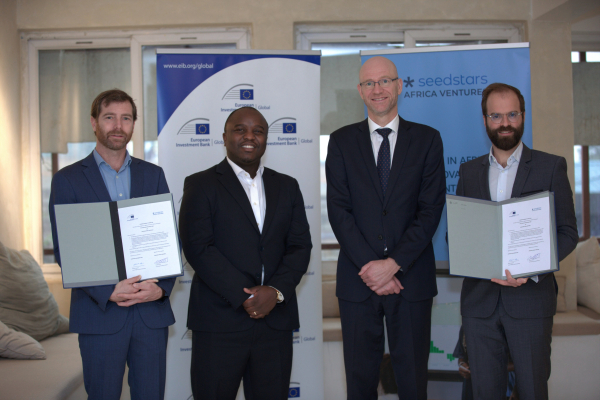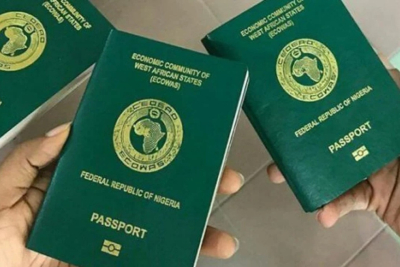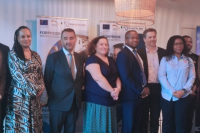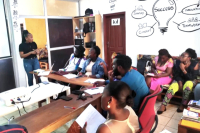Internet access restrictions have increasingly become a norm in Africa in recent years. A variety of factors contribute to the intentional suspension of the Internet, including limitations on information access, armed conflicts, and coups d'état among others.
In 2023, network outages impacted 84.8 million Internet users in sub-Saharan Africa. These disruptions, which lasted for 30,785 hours, resulted in estimated economic losses of $1.74 billion.
The region ranks second after Europe ($4.02 billion), surpassing Asia and the Middle East and North Africa region ($1.44 billion). A recent report published on Tuesday, January 2, by UK technology firm Top10VPN, sheds light on the restrictions that led to these financial losses. The report indicates that Internet restrictions due to peaceful protests were the most economically damaging in 2023.
Ethiopia experienced an estimated $1.59 billion in lost earnings in 2023 due to the extended suspension of social networks, including Facebook, YouTube, Telegram, and TikTok from February to July. This decision was made by the government in response to religious tensions. Similar restrictions were imposed in the Amhara region in early August due to escalating tensions with local militias, resulting in over 11,496 hours of social media shutdown.
In 2023, two major network outages occurred in Senegal in response to large-scale protests, affecting 8.01 million people. According to data from the Top10VPN platform, the total duration of the blockages is estimated at 135 hours, with financial losses valued at $57.4 million. This led to a surge in demand for VPN services to bypass the imposed restrictions, with an increase of over 60,000%.
Several other countries also experienced blackouts due to public protests, including Guinea, Mauritania, Kenya, Sudan, Tanzania, Algeria, Chad, and Zimbabwe. The report by digital security and privacy research group Top10VPN also cites other reasons for social network censorship in Africa. These include information control, conflicts, military coups, and electoral interference as additional causes of Internet blocking.
Samira Njoya
Despite a downturn in sector investment, Africa’s tech ecosystem continues to draw interest. The continent is seeing an influx of new investors keen to support innovative start-ups.
BEI Monde, a subsidiary of the European Investment Bank (EIB), has pledged a $30 million investment in the Seedstars Africa Ventures I venture capital fund, as announced on Wednesday, January 10. This initiative is backed by the secretariat of the Organization of African, Caribbean, and Pacific States (OACPS) through the Boost Africa program with a contribution of $10 million, and by the European Union via the ACP Trust Fund with a sum of $20 million. The objective is to spur growth and job creation across the continent by investing in businesses that utilize digital technologies to provide essential services and enhance business efficiency.
“Encouraging and promoting innovation and digitalization is crucial to developing strong and sustainable economies. African entrepreneurs hold the key to the continent’s future, creating jobs, reducing inequality, and improving quality of life. The EIB, as part of Team Europe, is committed to supporting African businesses, and we are proud of the success of Boost Africa and the ACP Trust Fund,” stated EIB Vice-President Ambroise Fayolle.
Despite a 36% decrease in fundraising by African startups to $3.2 billion by 2023, as reported by TechCabal Insights, the introduction of a new venture capital entity focused on Africa is a positive development. Startups can now access this fresh funding source to realize their projects and/or initiate their startup’s growth phase.
Most investors active on the continent are drawn to the tech ecosystems of Kenya, South Africa, Egypt, and Nigeria. In 2023, startups from these four countries represented 74.9% of financing rounds on the continent. The first four deals of Seedstars Africa Ventures I affirm this trend, with the fund backing two Kenyan startups (Poa! Internet and Shamba Pride), one Nigerian (Beacon Power Services), and one French (Bizao) startup with a focus on Africa.
Adoni Conrad Quenum
Digitization is proving indispensable for Africans, streamlining processes and fostering accessibility, thereby contributing significantly to socio-economic development across various sectors. This technological shift is empowering individuals and communities, paving the way for enhanced efficiency and inclusivity in the digital era.
Nigerian citizens and foreign applicants seeking passports can now submit applications online, as the country launched its new digital platform on Monday, January 8. This marks a significant shift from the previous paper-based system, aiming to ease the process and reduce delays.
The launch was spearheaded by Interior Minister Dr. Olubunmi Tunji-Ojo, who inaugurated the portal following a demonstration session held last Friday. This aligns with the federal government's commitment to full automation of passport applications, announced by the minister in December.
"The new online system represents a significant win for Nigerians seeking passports. No longer will they contend with long queues, cumbersome paperwork, and opaque procedures. Instead, they can expect a faster, more transparent, and more secure path to obtaining travel documents," Tunji-Ojo stated.
The user-friendly platform allows applicants to upload passport photos and supporting documents directly, streamlining the process and eliminating the need for physical visits to immigration offices.
Fees vary depending on nationality and desired passport validity period. Nigerian applicants pay N25,000 for a 32-page passport valid for five years and N70,000 for a 64-page passport valid for ten years. Foreign applicants face a charge of $130 for a five-year, 32-page passport and $230 for a ten-year, 64-page passport.
Hikmatu Bilali
Yousef Alhusaini, co-founder of the Kuwaiti educational platform Baims, recently announced the acquisition of Egyptian edtech company Orcas Tutoring. The financial details of the transaction were not disclosed. This acquisition allows Baims to extend its reach into Egypt and the United Arab Emirates, and to expand its services. The platform will now offer recorded content, live sessions, and personalized one-on-one tutoring for students ranging from kindergarten to grade 12.
Through its programs, ideiaLab offers valuable support to entrepreneurs and contributes to economic growth in Mozambique. It has received several awards and distinctions, proving its impact in Africa.
Established in 2010, ideiaLab is a Mozambican firm dedicated to inspiring entrepreneurs, fostering startups, accelerating small and medium-sized enterprises, and promoting entrepreneurship and innovation. Co-founders Sara Fakir (photo, left) and Tatiana Pereira (photo, right) established the company to harness entrepreneurship for inclusive growth and development. Tatiana Alves Pereira currently serves as its CEO.
ideiaLab operates as an innovative platform that nurtures high-impact ideas, empowers entrepreneurs, and bolsters businesses. It provides entrepreneurs with access to a vibrant community of peers, resources, and support to realize their visions.
The company offers a range of programs to assist entrepreneurs at all stages of their journey. These include Academia Boost, an academy focused on executive training to enhance management and leadership skills and stimulate the growth of executives, entrepreneurs, teams, and companies. Other notable programs include Acredita Emprega, aimed at boosting the productivity and income of young Mozambicans, and Agora Emprega, a national competition for business plans.
ideiaLab has also implemented specific programs to support women entrepreneurs, such as “FemTech”, a business acceleration program for women over 25. Additionally, the company has launched “iCreate”, a business-strengthening program designed to assist SME teams during challenging phases.
Since its inception, ideiaLab has trained 13,500 entrepreneurs, including 3,829 women, strengthened 8,129 business ideas, and supported 4,923 active companies. In recognition of its exceptional work, ideiaLab was awarded Best Workplace and Best Organizational Culture in 2019. It also received the award for Best Acceleration and Incubation Program at the inaugural Innovation Awards in 2022, underscoring ideiaLab’s significant impact on Africa’s entrepreneurial ecosystem.
Melchior Koba
After several years in the fashion retail industry, she founded a company empowering South Africans to resell their unused clothing.
Phumi Körber (photo), holder of a Higher National Diploma in Somatology from the University of Johannesburg and a Diploma in Communication Management and Brand Communication from the Vega School of Branding, is the founder of the e-commerce platform WiSi-Oi Resell Fashion App. Launched in 2020, WiSi-Oi is a video-based social platform for second-hand clothing resale, providing sellers with real-time analytics to manage their online stores and earn extra income.
WiSi-Oi, an acronym for WEAR IT. SELL IT. OWN IT, offers customers secure and reliable payment systems to purchase their favorite brands at discounted prices. The platform aims to reduce fashion waste by extending the lifespan of garments and promoting sustainable circular fashion. “The aim is to extend the life of clothes that are already in circulation and reduce the need to buy new clothes all the time. The business also offers an empowerment factor, where sellers can generate an income just by selling clothes that are hanging in their closets,” Körber told Disrupt Africa in 2022.
Before founding WiSi-Oi, Körber worked as a category manager for hair care at health, beauty, and wellness retailer Clicks in 2014. She later joined The Foschini Group, a fashion retailer, as an e-commerce and marketing manager in 2018. In 2023, AfricArena accelerator recognized Körber’s startup as the best femtech startup.
Melchior Koba
The United Nations has identified affordable internet access as a key sustainable development goal. However, some leaders, despite their ongoing efforts to develop their countries, are restricting internet access to their populations for various reasons.
Since November 24, 2023, the Guinean government has imposed restrictions on internet access and social media platforms including Facebook, WhatsApp, Telegram, Instagram, YouTube, and TikTok. According to the British platform Top10VPN, these measures have cost the country approximately $47.4 million. The Guinean authorities have not yet explained the restrictions.
This blackout, which has lasted over 40 days, is not the first instance of such restrictions. In May 2023, amidst popular protests, the government limited access to social media for three days. According to the 2022 annual report of the local telecom regulator ARPT, Guinean internet users experienced 3,720 hours of internet outages and social media restrictions in 2023, affecting 6.98 million mobile internet subscribers.
Earlier this year, the Guinean tech industry association RESTIC –Rassemblement des entreprises du secteur des technologies de l'information et de la communication– called for the immediate restoration of internet access in the country and appealed to the Economic Community of West African States (ECOWAS) for assistance in persuading the current regime.
Despite the ongoing digital transformation in Africa, several regimes have used internet restrictions to silence their populations. Senegal and Ethiopia, for instance, lost $57.5 million and $1.59 billion respectively in 2023 due to internet and social media blackouts, according to Top10VPN. Notably, Ethiopia is the second country to incur such significant losses due to internet and social media blackouts. It's worth noting that this practice is not exclusive to African countries. Amidst the war in Ukraine, Russia has resorted to similar measures, as have countries like Iran, Iraq, and Brazil.
Adoni Conrad Quenum
Digital skills are set to play a pivotal role in the upcoming global technological revolution. According to a report by the International Finance Corporation (IFC), the demand for digital skills is projected to grow at a faster pace in sub-Saharan Africa compared to other global markets.
The German Society for International Cooperation (GIZ) and the European Union (EU) launched a digital training program for Ivorian youth, named "WE.CODE", in Abidjan on Monday, January 8. The program aims to provide 300 young individuals, aged between 18 and 35, with the necessary digital skills for the job market, thereby facilitating their professional integration.
This initiative is a part of the Invest for Jobs program, co-funded by GIZ and the EU. "By offering programs tailored to the needs of the digital job market, we aim to equip our learners with the skills they need to excel in an increasingly connected world," said Marc Levesque, a representative of the Invest for Jobs program.
Selected candidates will receive training in full-stack development, data management, and IT security. The training will be conducted in collaboration with two major digital sector entities in Côte d'Ivoire, Epitech University and MStudio.
The WE.CODE program, implemented by the German Federal Ministry for Economic Cooperation and Development (BMZ), is developing a package of measures to support German, European, and African companies in investment activities that have a high employment impact in Africa. The program aims to create up to 100,000 jobs and improve working conditions and social protection in its eight African partner countries: Côte d'Ivoire, Egypt, Ethiopia, Ghana, Morocco, Rwanda, Senegal, and Tunisia.
Applications for the program can be submitted until Thursday, February 15, 2024, via the program's website.
Samira Njoya
High transaction costs in financial dealings are a significant issue across Africa. To address this problem, some actors are exploring the use of blockchain technology, with the endorsement of the Central Bank.
The Central Bank of Nigeria (CBN) has given its approval for the launch of a stablecoin, a type of crypto asset that maintains a steady value against an official currency, providing an alternative payment method. The stablecoin, named cNGN, is set to launch on February 27 and will be indexed to the naira. The Africa Stablecoin Consortium (ASC), a collective of Nigerian banks and fintech companies, is behind the initiative, aiming to elevate the naira to a global digital currency.
“The cNGN ushers in a new era of financial fluidity, bridging the Nigerian Naira with the global market through blockchain technology. Backed 1:1 by Naira reserves held in designated commercial banks, the cNGN Stablecoin transforms the Naira into a dynamic tool for worldwide remittances, commerce, trade, and investment,” the CSA stated.
This development comes two years after the CBN introduced the eNaira, a central bank digital currency launched in October 2021 to increase financial inclusion and facilitate financial transactions, particularly cross-border remittances, at a lower cost. However, a May 2023 report by the International Monetary Fund titled “Nigeria’s eNaira, One Year After” revealed that the adoption of the eNaira has not met the CBN’s expectations.
The CSA believes that the cNGN will address the shortcomings of the eNaira. Unlike the eNaira, the cNGN will not require a dedicated wallet and will be accessible on certain public blockchains like other cryptoassets.
“More than just a currency, cNGN shortens settlement times, enabling payments that traverse the globe swiftly, mirroring the speed of a text message and at a fraction of the cost. This breakthrough paves the way for instantaneous financial transactions, seamlessly connecting Nigeria’s vibrant economy with international markets and offering unprecedented efficiency in both domestic and global financial interactions,” the statement read.
Adoni Conrad Quenum
Beehive Incubator & Coworking is a key player in Cameroon's entrepreneurial ecosystem. It offers incubation and coworking opportunities to startups, entrepreneurs, and freelancers.
Established in 2019, Beehive Incubator & Coworking is a Cameroonian incubator and workspace for startups and entrepreneurs across Africa. Led by Solange Majolaine Tchato, the organization is committed to fostering startups and freelancers by providing an environment that encourages innovation and growth.
It offers a variety of services designed to meet the needs of startups. Its incubation program assists project leaders throughout their development journey, from conducting market studies to formulating their business models. The organization also provides strategic and practical training courses on key topics such as startup management, marketing, communication, finance, accounting, law, and business intelligence.
As an incubator, Beehive helps entrepreneurs validate their concepts by acquiring their first paying customers. It hosts events, including the StartUp MeetUp, which is dedicated to founders of Cameroonian and African startups. The incubator also provides open spaces and private offices, along with domiciliation and secretarial services for companies.
Understanding that funding is often the primary challenge for startups, Beehive Incubator & Coworking also aids entrepreneurs in their quest for financing at every stage of their project. It assists startups in their international expansion strategies by identifying potential partners.
The incubator is making a significant impact on Africa's tech landscape, currently incubating a range of startups. These include Light, a company specializing in connected devices and intelligent solutions, Beauty House, an online home hairdressing service, and Med-sync, a fully online medical secretarial service.
Melchior Koba
More...
Across Africa, progress in bridging the digital divide remains uneven, with some regions lagging despite efforts by governments and international organizations. Initiatives to create a critical mass of digital specialists continue to fall short, leaving many countries struggling to fully capitalize on the digital revolution.
Commonwealth Business Women Africa (CBW-A), a Nigerian organization focused on empowering African women in leadership and entrepreneurship, has partnered with educational technology firm Kodris Africa to train one million girls in coding across 22 African countries.
The initiative aims to transform the teaching of science, technology, engineering, and mathematics (STEM) subjects and promote gender equality in the tech industry. According to Kodris Africa CEO Mugumo Munene, the program equips young girls with 21st-century skills such as design thinking, critical thinking, and algorithmic thinking. “The coding skills they acquire will also lead them to online environments where they can pick jobs as soon as they attain the age of 18, deliver remotely, and receive payments from the comfort of their homes,” he added.
As Africa navigates the ongoing technological revolution, initiatives like the U.S. government’s TechWomen program aim to increase the representation of African women in STEM professions. Networks such as the WomenTech Network support women in various tech roles, fostering an environment conducive to their self-fulfillment.
“Across Africa, the underrepresentation of girls in STEM fields remains a significant challenge,” said Nana Wanjau, CBW-A’s Vice President for Africa. “According to UNESCO, women make up only 28% of STEM graduates globally, and the situation is even starker in Africa, where girls often face cultural barriers and limited access to quality STEM education,” she explained.
Adoni Conrad Quenum
Nigerian fintech startup Cleva has secured $1.5 million in pre-seed funding, Techcrunch reported on Monday, January 8th. The funds will fuel the development of Cleva's financial technology platform and commercial offering, as well as support the company's initial operations. Cleva also announced it secured a spot in the Winter 2024 cohort of Californian accelerator Y Combinator.
As digital proficiency becomes increasingly vital across multiple sectors, pressure is mounting on governments to bridge the skills gap and equip citizens with the tools to thrive in the digital age.
In a bid to bridge the digital gap and equip young Liberians with the tools to succeed in the 21st century, local IT company 231Data launched a free digital transformation training program on January 2nd.
"Our objective is to narrow the digital divide in Liberia by providing a significant segment of the population, particularly women and youth, with fundamental digital skills," said Niahson Porte, CEO of 231Data, at the program's inauguration in Paynesville.
The month-long initiative, backed by the Liberia Telecommunications Authority (LTA), aligns with the goals of the World Summit on the Information Society (WSIS), a global platform addressing the challenges and opportunities of the digital age.
The program targets Liberians aged 11 to 35, focusing on demographics often left behind in the digital revolution. Starting with an initial 60 trainees in Paynesville, the program aims to reach 10,000 across the country over the next two years.
Each session comprises two hours of training per day for two weeks, with 15 participants per group to ensure personalized attention. The curriculum covers essential skills like computer literacy, internet navigation, and basic software applications.
The program's ambitions go beyond technical proficiency. It seeks to empower individuals and communities to access education and information online, bridge the digital divide, and contribute to Liberia's economic development.
Samira Njoya
Through its incubation and acceleration programs, it stimulates innovation and supports entrepreneurs across the continent. It has supported over 1,000 startups and created thousands of direct and indirect jobs.
xHub Addis, an incubation and acceleration center founded in 2014 by entrepreneur Tewodros Tadesse, is a hub for IT entrepreneurs, innovators, technologists, investors, technology companies, and coders in Ethiopia.
Based in Addis Ababa, the center offers a range of services for startups, including custom software development, IT management services, training, IT strategy consulting, and web development. It aids in the development of businesses and services across various sectors, including information technology, agribusiness, communications, health, transport, engineering, art, design, and education.
xHub Addis has established various incubation and acceleration programs, workshops, events, and networking opportunities to foster leadership and entrepreneurship across a wide range of industries. These efforts aim to cultivate successful innovators.
Among its programs is the Waka Tech Project, a 3 to 5-month initiative that invites companies specializing in technology, education, climate, sustainable solutions, fintech, and more. The center also served as a consultant to the Tifter Ethiopia program of the Ministry of Innovation and Technology and the UNDP, designed to find and support innovators creating solutions to prevent, detect, and control COVID-19.
In terms of impact, xHub Addis has incubated 1,500 companies and graduated 1,200 startups, creating 5,000 indirect jobs and 300 direct jobs. It is supported by several institutions, including UNDP, Mastercard, the British Council, Rotary International, Amref Health Africa, and Reach for Change.
Melchior Koba















